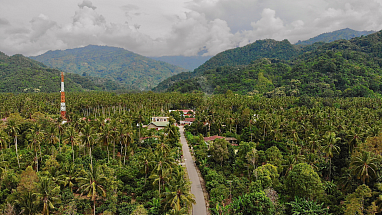Cocoa for Generations
Sustainable Cocoa Tomorrow
Today, most cocoa is grown on small family farms with little access to electricity, clean water, reliable roads, or quality schools. These farmers also face the negative effects of climate change and persistent market failures. Despite past industry efforts to improve farmer livelihoods, the unfortunate reality is smallholder farmer poverty has not been eradicated.
Cracking the code on transitioning smallholder farmers to a truly sustainable approach to cocoa farming is crucial.
It matters to the future success of our business and the success of cocoa farming families. And it’s critical for us to live up to the principles of responsibility and mutuality we set for ourselves at Mars.
We see great opportunity for a real change and have embarked on a holistic, development journey to achieve and sustain a living income for cocoa growing communities.
Based on research from the Farmers Income Lab, a “think-do” tank founded by Mars, companies sourcing strategies should bundle interventions, customize approaches, and partner to drive impact at scale.
In 2022, Mars applied findings from the Lab to launch a series of test-and-learn pilots. These pilots blend best-practice interventions designed to unlock farmers’ entrepreneurial skills, diversify income, and boost productivity. The ultimate goal? To fortify farm resilience and accelerate incomes. We aim to scale these successful strategies and put 15,000 cocoa farmers in Ghana, Côte d’Ivoire, and Indonesia on a sustainable living income path by 2030.
We believe these pilots could be the industry’s most comprehensive effort to-date designed to address persistent barriers to cocoa farmers’ ability to achieve a living income.
“Ten years ago, Mars decoded the cocoa plant genome for the first time. Today we are aiming to crack the code on a sustainable living income for cocoa farmers to enable them and their families to thrive for generations,” said Barry Parkin, Mars Chief Sustainability and Procurement Officer. “Efforts to improve farmer livelihoods based on stopgap measures or single issues in isolation will not create the change that is required. Farmers may understand what needs to be done to improve their crops and their livelihoods but might not have the market support to make those changes. In this new effort, we are committing to help remove the obstacles in their path, particularly lack of access to finance and the need to adapt to climate change.”
Our focus is on testing and learning on how to address challenges created by market failures and climate change by bundling interventions around credit and financial inclusion, agroforestry and income diversification, helping to create the conditions in which families with small cocoa farms can lift themselves out of poverty.
LEAP (Livelihood Ecosystem Advancement Program) – Côte d’Ivoire
Mars, Fairtrade and ECOOKIM are embarking on a holistic development journey to achieve and maintain a living income for cocoa growing communities. Drawing on more than 10 years of collaboration between the project partners, the LEAP program intends to address past market failures and permanently improve outcomes for farmers. This unique initiative integrates measures that promote systemic change. The goal is to establish the fastest, most efficient, most viable route to a living income for all cocoa farmers.
ACTIVE (Advancing Cocoa Agroforestry Towards Income, Value & Environmental Sustainability) – Indonesia
This alliance of collaborating partners aims to promote cocoa agroforestry practices that address both climate change mitigation and adaptation, while improving smallholder farmer livelihoods. I4DI, Mars, and USAID co-designed ACTIVE with the aim of providing farmers with access to appropriate technologies, market infrastructure and improved financing. ACTIVE builds on evidence gathered by Mars and I4DI over a six-year period and is expected to equip farmers and their families with alternative business models and take promising practices to scale for improved climate resilience and household incomes.
Cocoa Yiedie Initiative in Ghana
Launched in 2022 through the Livelihoods Fund for Family Farming (L3F), the Cocoa Yiedie Initiative in Ghana(Opens a new window) forms a coalition comprising Mars, cocoa supplier Touton, Solidaridad West Africa (a local implementer with extensive smallholder experience in West Africa), and I4DI (a trusted scientific partner tasked with evaluating project impacts).
Livelihoods and its partners are collaborating on an innovative 3-year project to uncover strategies to uplift cocoa farmers from poverty and enable a shift towards more sustainable agroforestry models that increase farmers' income. By addressing various farmer needs, such as skills, finances, and labor, the initiative aims to promote Good Agricultural Practices and invest in replanting activities. This flexible approach allows partners to test different approaches with separate groups of farmers and adjust as needed, all with the shared objective of helping farmers move towards a sustainable income level.
The findings from these new programs will be used to create a blueprint of best performing interventions that Mars can scale across the cocoa supply chain and share with the cocoa sector to accelerate the path towards sustainable living income for cocoa farmers.
Empower women and communities
Our goal by 2025: Expand CARE’s Village Savings and Loans Associations (VSLAs) to help economically and socially empower women and men through financial literacy, household savings and loans, and diversified income.
The empowerment of women and girls in the cocoa supply chain catalyzes progress toward increasing incomes, protecting human rights and preserving forests. Mars envisions a world where cocoa farming is truly inclusive, where resources are offered in a non-discriminatory manner and accessible to all cocoa farmers regardless of gender, and where women and girls in cocoa farming communities can reach their full potential.
Empowering Communities Through Our Unique Women for Change program
To make that vision a reality, in 2016 Mars has teamed up with CARE to create the ‘Women for Change’ program(Opens a new window). The Women for Change (W4C) model, which originated in Côte d’Ivoire and is grounded in a proven theory of change, builds on CARE’s successful Village Savings & Loan Association (VSLA) approach.
W4C is designed to empower participants in multiple ways. The program increases access to vital resources and leverages collective power to break down social and financial barriers. It focuses on four key areas: Financial Inclusion, Entrepreneurship, Gender Equity, and Healthy Families. The goal is not only to improve gender equity within households and communities but also to achieve tangible benefits like increased savings, skill enhancement, and income growth. Additionally, the program aims to elevate school enrollment rates and boost nutrition levels.
Another unique aspect of W4C is its effort to shift social norms and reduce gender-based violence. It involves men in the process, encouraging joint saving and decision-making. By employing this multifaceted approach, W4C strengthens women's roles in the cocoa supply chain, using a well-balanced mix of solutions.
Encouraged by the results achieved by W4C, in 2020, Mars committed to scale up the W4C model with an additional investment of $10 million, including an expansion of the model to Ghana. As of 2022, the program has already exceeded its initial targets by reaching more than 77,000 W4C VSLA members (over 75% are women). That number is expected to reach 100,000 by the end of 2023. To date, the W4C members have collectively saved over $7.4 million in total to invest back into in their businesses and family needs(Opens a new window).
Mars is also taking action for women in the cocoa supply chain through its iconic brands, like Dove Galaxy. In 2023, Dove Galaxy pledged to ‘help one million people including women, their families and their communities thrive by 2030'.
Embedding A Gender Transformative Approach
Women and girls' empowerment is a dynamic and transformative process of change, which requires addressing gender inequalities and disempowerment across multiple dimensions. To address these challenges, we partnered with the Royal Tropical Institute(Opens a new window) (KIT) to conduct qualitative research to understand and explain behaviors, experiences, and attitudes in relation to the inequality and disempowerment that women face in their daily lives in cocoa growing communities in Côte d’Ivoire, Ghana, and Indonesia. It was concluded that the longer-term, often overlooked and neglected “mainstreaming” work of changing mindsets and social norms is essential if we want to make meaningful progress in lowering barriers to equality, reducing poverty, and unlocking the full potential of women and girls. Mars is committed to taking action by embedding a gender transformative lens(Opens a new window) into its cocoa policies, strategies, partnerships and programs linked to human rights, the environment, and farmer income.
The detailed findings have been described in the following two reports:
Improve productivity
Our goal: Support families with farm development plans that improve productivity to over 1 metric ton of cocoa per hectare.
Supporting Enterprise with Farm Development Plans
Improved productivity will help farmers grow more cocoa on less land to help preserve forests and increase farmer income. A long-term farm development and restoration approach was developed in partnership with our cocoa and science research team, global experts like World Agroforestry Institute (ICRAF), cocoa producing countries, field agents, suppliers and farmers. This approach is tailored to each farm and family and provides the benefits of applied science with continuing coaching, quality cocoa trees, an investment schedule and other farm inputs to raise yield.
Creating Farmer Advice Networks
Access to better agricultural inputs and advice will help cocoa growers improve and maintain the health of their farms. Mars, together with our partners, has supported cocoa famers in Indonesia since 2012 through our Cocoa Development Center (CDC) and Mars Cocoa Academy in Luwu Raya, South Sulawesi, where cocoa farmers can study modern farming techniques and become Cocoa Doctors, helping farmers to dramatically increase their cocoa production.
Since its inception in 2012 the Mars Cocoa Academy has trained more than 4,300 Cocoa Doctors.
These specialists, who run their own cocoa businesses, provide advice and coaching to fellow farmers. Once established – one Cocoa Doctor can effectively reach 150-200 farmers each. We’ll continue to learn how this network can best support farmers.
Meet some of the people(Opens a new window) directly involved and learn about the impact on their lives and their livelihoods.
Improving Scientific Understanding
Good science is needed to ensure healthier, more resilient and more productive cocoa plants. We continue to work extensively with universities globally, ICRAF in West Africa, the United States Department of Agriculture Agricultural Research Service, and conduct research at our own centers in Indonesia, Brazil and the United States. In Ecuador, our research farm, Mars La Chola, is putting our plant science learnings into practice at scale, helping us test which insights can best benefit farmers.
Diversify income
Our goal: Improve household income with diversified farming, agroforestry and other alternatives beyond farming.
Building diversity and resilience in farming is important. We continue to build understanding on how best to implement diversified farming in Indonesia and West Africa through our own projects and in partnership with ICRAF. We will work with farmers to roll out learnings shown to meaningfully increase income from livestock and other cash, timber and food crops.
Cocoa for Generations 2022 report
At Mars, as one of the world's leading purchasers of cocoa beans and products globally, we acknowledge our role in the sector is unique and the responsibility it entails within the industry.
Cocoa holds a special place in our heritage. For over a century, we've sourced cocoa for our beloved brands, contributing to Mars’ pursuit of quality growth. Beyond its significance to us, cocoa is essential to the livelihoods of approximately 350,000 farmers in our global supply chain, many of whom are smallholders. We depend on cocoa farming communities, and this mutual relationship drives us to continuously strive to be a trusted partner.
In 2018, through our Cocoa for Generations strategy, we committed a billion dollars over a period of ten years to drive real change ensuring 100% of our cocoa is responsibly sourced and traceable to the first point of purchase by 2025. Our latest annual update – available to read here(Opens a new window) – details how Mars and our key partners are working to create a modern, inclusive and sustainable cocoa ecosystem where everyone can thrive.
2022 Cocoa for Generations Report
Track our progress toward more sustainable cocoa production.
Download our PDF report.
More about our Cocoa for Generations Plan
Learn more about our Cocoa for Generations Plan


Cocoa for Generations


Responsible Cocoa Today


Cocoa Research & Science



Cocoa for Generations


Responsible Cocoa Today


Cocoa Research & Science















